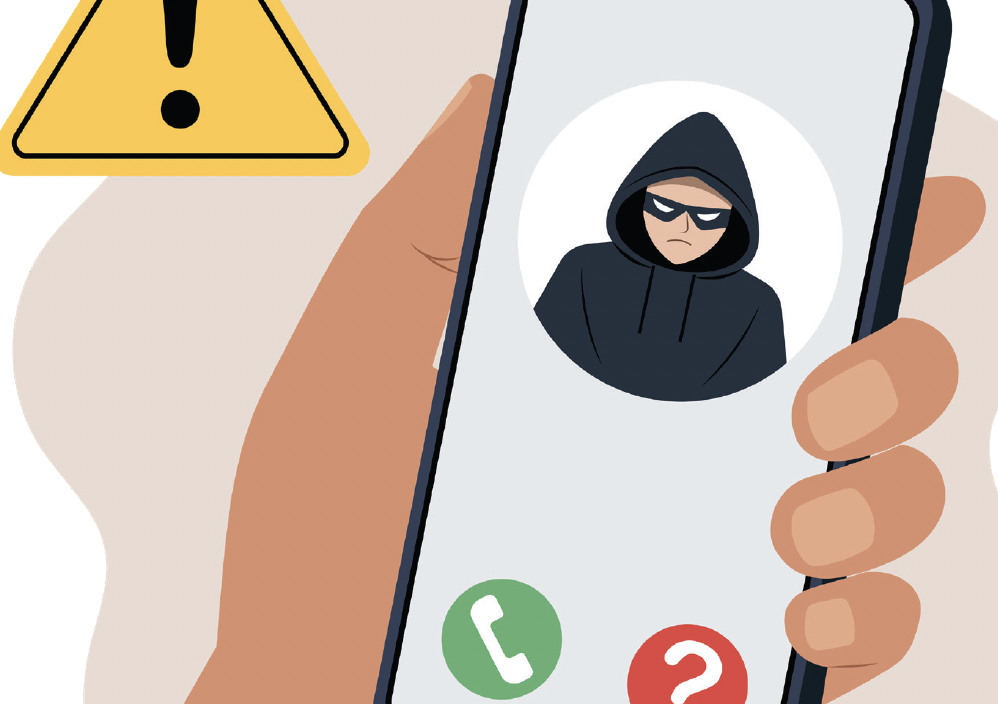Energy Scams
By Jennah Denney and Nina Todea
Be aware of calls, texts and visits from scammers posing as utility workers
Electric cooperatives and public power utilities across the country are urging members to stay alert as utility-related scams continue to evolve. Fraudsters are becoming more aggressive and more convincing—using impersonation, false urgency, and digital deception to extract payments or personal information from unsuspecting individuals.
Reports of scam calls, fake energy rebates and phony disconnection threats have increased recently. These schemes often begin with a phone call, text or even a visit from someone claiming to represent a local electric provider.
In 2024, impostor schemes—such as scammers pretending to be from utility companies—were the most commonly reported scam category, according to the Federal Trade Commission.
Their tactics vary, but the goal is always the same: pressure the consumer into acting quickly before they have time to verify the request.
In some elaborate plans, scammers demand immediate payment, threatening that service will be shut off within minutes. Others offer too-good-to-be-true incentives, such as rebates, energy audits or free equipment installations—if the consumer provides banking information or pays an upfront fee.
Scammers can even manipulate caller ID to appear as though the call is coming from a trusted utility number.
Mt. Wheeler Power, based in Ely, Nevada, has—like many others—seen a rise in these scam attempts.
“The most common reports are phone calls threatening disconnection unless an immediate payment is made, but recently, a member shared a photo of a very official-looking letter claiming that her home warranty—supposedly managed by Mt. Wheeler—was about to expire,” says Christina Sawyer, Mt. Wheeler Power internal communications specialist. “Of course, we’re not in the home warranty business, but scammers used our name to try to solicit money.”
Identifying a Scam
Scams aren’t limited to calls. They can arrive as emails, text messages or QR codes designed to look like real payment portals. Typically, the links redirect to fraudulent websites that steal sensitive data.
Scammers may also encourage consumers to pay through untraceable methods, such as prepaid debit cards, unauthorized mobile apps or cryptocurrency—methods legitimate utilities never use.
Although digital attacks are more common, one concerning trend involves scammers visiting homes unannounced, posing as utility workers conducting inspections or installations.
In addition to secure online payment portals and clearly marked billing statements, Mt. Wheeler Power’s layered approach to protection includes company-branded vehicles and uniforms for field staff.
Without proper identification or appointment confirmation, visits by individuals claiming to be utility representatives should always be treated with caution.
How Utilities Communicate
Electric cooperatives and public power utilities never call and demand immediate payment. They never ask for banking or account information over the phone, nor do they pressure a consumer to act without the opportunity to verify the situation.
If someone claiming to be from your electric utility insists on urgency or payment through nontraditional means, that’s a red flag.
“Our member service representatives go through specialized training, so they know exactly how to identify themselves and communicate with members,” Christina says. “This consistency helps members recognize what a real co-op interaction sounds like. Our MSRs will never pressure someone for immediate payment over the phone, and they always follow established protocols.”
Education and awareness remain two of the most powerful tools in this fight.
“We regularly share scam alerts through social media, bill inserts and our magazine,” Christina says. “Our staff also receives ongoing training so they can quickly respond to members’ concerns and help them report suspicious activity appropriately.”
If something doesn’t feel right, Christina recommends one simple step: “Hang up, and call us directly at our published number. If it’s a legitimate communication, our team will confirm it. If not, we’ll log the report and make sure other members are alerted.”
Your electric utility can be contacted directly using the number listed on your monthly bill or on the utility’s website.
Community Awareness
Consumers are encouraged to talk with family, friends and neighbors about the warning signs of scams. Sharing information helps others stay safe.
“Because that member was thoughtful enough to share the letter with us, we were able to post it on our social media and alert others to be on the lookout,” Christina says.
Even if a consumer doesn’t fall for a scam, reporting it to the utility is important. These reports help the utility track patterns, warn the community and work with law enforcement when appropriate.
“Community awareness is one of the most effective tools we have,” Christina says. “When members share their experiences, it makes it harder for scammers to succeed. We would rather have a member double-check than risk being taken advantage of.”
Electric cooperatives and public power utilities are built on trust, service and community. By working together, consumers and electric utilities can help expose fraud for what it is—and ensure scammers are left in the dark.
3 Tips for Password Security
From the U.S. Cybersecurity and Infrastructure Security Agency:
1) Make them long.
At least 16 characters—longer is stronger.
2) Make them random.
Option A: Use a random string of mixed-case letters, numbers and symbols (e.g., cXmnZK65rf*&DaaD, Yuc8$RikA34%ZoPPao98t).
Option B: Create a memorable phrase of 5–7 unrelated words, then get creative with spelling and add a number or symbol.
-
Strong:
HorsePurpleHatRunBaconShoes -
Stronger:
HorsPerpleHatRunBayconShoos -
Strongest:
HorsPerpleHat#1RunBayconShoos
3) Make them unique.
Use a different strong password for each account.
-
Bank:
k8dfh8c@Pfv0gB2 -
Email:
LmvF%swVR56s2mW -
Social:
e246gs%mFs#3tv6
Password managers (in your browser, standalone software or apps) can help you keep track of longer, more complex passwords.

